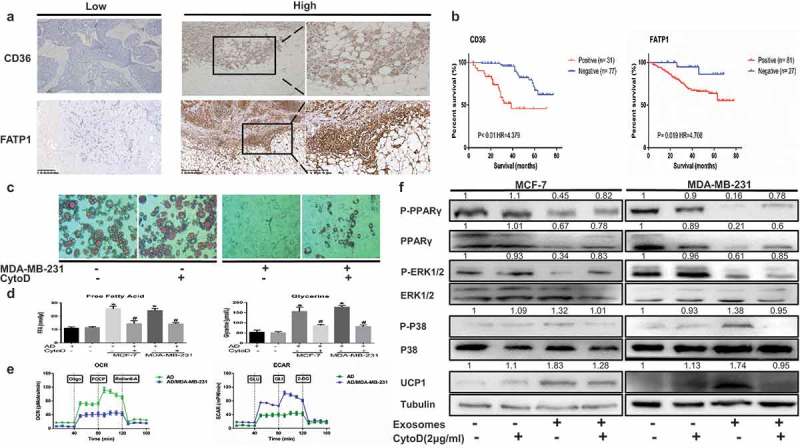Figure 1.

Breast cancer-derived exosomes reshape metabolic characteristics in adipocytes and metabolite biomarkers in breast cancer are linked to a poor prognosis. (A) Representative immunohistochemistry staining of CD36 and FATP1. The pictures also show positive staining for FATP1 and CD36 in breast cancer tissues located near stromal adipocytes. (B) Kaplan-Meier survival analysis of patients with biomarker-positive and biomarker-negative IHC staining. (C) Mature adipocytes after treated were stained with red oil. The adipocytes in the CytoD group were treated with cytochalasin D (final concentration, 2 μg/ml) and 50 μg of exosomes purified from cancer-associated conditioned medium (CA-CM) (enlarged 100X). (D) The levels of secreted metabolites (glycerol and free fatty acids) enriched in media were determined by colorimetric assay. AD: adipocytes. (E) Raw data for the oxygen consumption rate (OCR) and extracellular acidification rate (ECAR) as determined by the Seahorse XF24 analyzer. The ECAR was evaluated after the addition of 10 mM glucose to adipocytes in the presence or absence of exosomes. The OCR was measured in the presence of palmitate as described in the Methods. (F) Adipocytes were cocultivated in the presence or absence of exosomes. After 3 days, proteins were extracted for western blot analysis of the expression of the indicated proteins. The numbers represent the relatively quantitative results compared to the control group. Data are presented as the mean ± S.D. of at least three independent experiments. * P < 0.05 versus control values.
